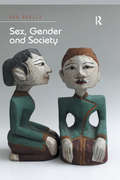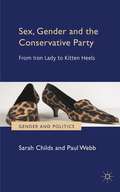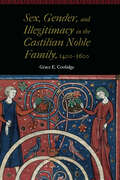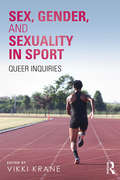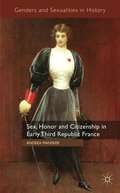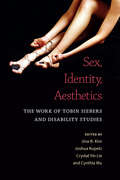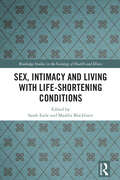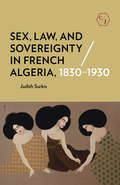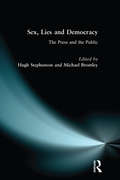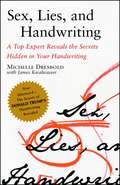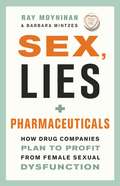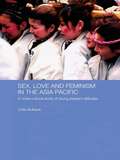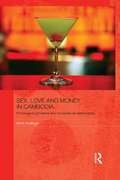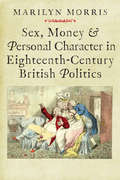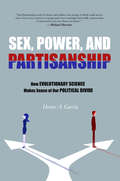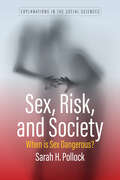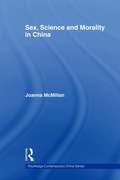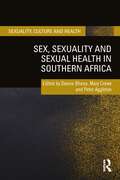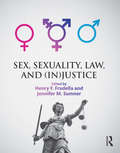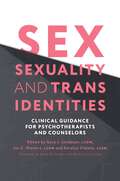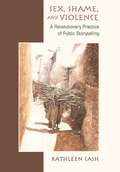- Table View
- List View
Sex, Gender and Society
by Ann OakleyWhat are the differences between the sexes? That is the question that Ann Oakley set out to answer in this pioneering study, now established as a classic in the field. To answer it she draws on the evidence of biology, anthropology, sociology and the study of animal behaviour to cut through popular myths and reach the underlying truth. She demonstrates conclusively that men and women are not two separate groups: rather each individual takes his or her place on a continuous scale. She shows how different societies define masculinity and femininity in different and even opposite ways, and discusses how far observable differences are based on biology and psychology and how far on cultural conditioning. Many books have discussed these vital issues. None, however, have drawn on such an impressively wide range of evidence or discussed it with such clarity and authority. Now newly reissued with a substantial introduction which highlights its continuing relevance, this work will continue to inform and shape dialogues around sex and gender for a new generation of scholars and students.
Sex, Gender and the Conservative Party
by Sarah Childs Paul WebbAs leader of the Conservative party, David Cameron inherited a multi-faceted gender problem: only 17 women MPs; an unhappy women's organization; electorally uncompetitive policies 'for women'; and a party which was seemingly unattractive to women voters. This book is an account of the feminization of the party since 2005.
Sex, Gender, and Illegitimacy in the Castilian Noble Family, 1400–1600 (Women and Gender in the Early Modern World)
by Grace E. CoolidgeSex, Gender, and Illegitimacy in the Castilian Noble Family, 1400–1600 looks at illegitimacy across the fifteenth and sixteenth centuries and analyzes its implications for gender and family structure in the Spanish nobility, a class whose actions, structure, and power had immense implications for the future of the country and empire. Grace E. Coolidge demonstrates that women and men were able to challenge traditional honor codes, repair damaged reputations, and manipulate ideals of marriage and sexuality to encompass extramarital sexuality and the nearly constant presence of illegitimate children. This flexibility and creativity in their sexual lives enabled members of the nobility to repair, strengthen, and maintain their otherwise fragile concept of dynasty and lineage, using illegitimate children and their mothers to successfully project the noble dynasty into the future—even in an age of rampant infant mortality that contributed to the frequent absence of male heirs. While benefiting the nobility as a whole, the presence of illegitimate children could also be disruptive to the inheritance process, and the entire system privileged noblemen and their aims and goals over the lives of women and children. This book enriches our understanding of the complex households and families of the Spanish nobility, challenging traditional images of a strict patriarchal system by uncovering the hidden lives that made that system function.
Sex, Gender, and Sexuality in Sport: Queer Inquiries
by Vikki KraneDiverse sex, gender, and sexual identities historically have been pushed to the margins in sport. While there is more visibility and inclusion for LGBTIQ (lesbian, gay, bisexual, transgender, intersex, queer) people in sport today than in the past, there still exists bigotry and marginalization. In this book, Vikki Krane and a team of leading sport scholars critically assess what we know about sex, gender, and sexuality in sport; expose areas in need of further inquiry; and offer new avenues for theory, research, and practice. Drawing on cultural studies perspectives, and with social justice at the heart of every chapter, the book discusses theory, policy, practice, and the experiences of LGBTIQ people in sport. Sex, Gender, and Sexuality in Sport is an important read for undergraduate and postgraduate students in any class with content on LGBTIQ people in sport, but particularly for those studying sport and gender, sexuality and sport, LGBT studies, psychology of gender, contemporary issues in sport, sociology of gender, and sport and higher education. It is also a vital resource for scholars who conduct research in the area of LGBTIQ people in sport.
Sex, Honor and Citizenship in Early Third Republic France
by Andrea ManskerA repositioning of French women's struggle for suffrage within the distinct cultural landscape of the masculine honour system. Whether activists demanded admission to the popular ritual of the duel or publicly shamed men for their extramarital sexual behaviour, they appropriated extralegal honour codes to enact new civic and familial identities.
Sex, Identity, Aesthetics: The Work of Tobin Siebers and Disability Studies
by Joshua Kupetz Cynthia Wu Jina B. Kim Crystal Yin LieThe late Tobin Siebers was a pioneer of, and one of the most prominent thinkers in, the field of disability studies. His scholarship on sexual and intimate affiliations, the connections between structural location and coalitional politics, and the creative arts has shaped disability studies and continues to be widely cited. Sex, Identity, Aesthetics: The Work of Tobin Siebers and Disability Studies uses Siebers’ work as a launchpad for thinking about contemporary disability studies. The editors provide an overview of Siebers’ research to show how it has contributed to humanistic understandings of ability and disability along three key axes: sex, identity, and aesthetics. The first section of the book explores how disability provides a way for scholars to theorize a wider range of intimacies and relationalities, arguing that disabled people seek sexual access and revolution in ways that transgress heteronormative dictates on sexual propriety. The second part of the book works outward from Siebers’ work to looks at how disability broadens our concepts of social location and political affiliations. The final section examines how disability challenges traditional notions of artistic beauty and agency. Rather than being a strictly commemorative collection meant to mark the end of a major scholar’s career, this collection shows how Siebers’ foundational work in disability studies remains central to and continues to inspire scholars in the field today.
Sex, Intimacy and Living with Life-Shortening Conditions
by Sarah Earle Maddie BlackburnThis multi-disciplinary and inclusive collection brings together theoretically informed and empirically focused research on sex, intimacy and reproduction in relation to young people and adults with life-shortening conditions. Advances in healthcare mean that increasing numbers of young people with life-shortening conditions are transitioning into adulthood. Issues such as sex and intimacy, dating and relationships, fertility and having children are increasingly relevant to them and to the people that support them, including families, carers, practitioners and professional education, health and social care agencies. This three-part book explores the relevance and significance of this field, examines everyday experiences, and highlights the challenges faced by individuals and organisations in addressing the needs of such people in daily life and in the context of practice. Drawing on perspectives from sociology, disability studies, epidemiology, health policy, psychotherapy, legal studies, queer studies and nursing, this ground-breaking volume is written by academics, policy makers, practitioners and experts by experience. It is an essential read for all those practising and researching in the fields of sexuality, chronic illness and disability and transition.
Sex, Law, and Sovereignty in French Algeria, 1830–1930 (Corpus Juris: The Humanities in Politics and Law)
by Judith SurkisDuring more than a century of colonial rule over Algeria, the French state shaped and reshaped the meaning and practice of Muslim law by regulating it and circumscribing it to the domain of family law, while applying the French Civil Code to appropriate the property of Algerians. In Sex, Law, and Sovereignty in French Algeria, 1830–1930, Judith Surkis traces how colonial authorities constructed Muslim legal difference and used it to deny Algerian Muslims full citizenship. In disconnecting Muslim law from property rights, French officials increasingly attached it to the bodies, beliefs, and personhood.Surkis argues that powerful affective attachments to the intimate life of the family and fantasies about Algerian women and the sexual prerogatives of Muslim men, supposedly codified in the practices of polygamy and child marriage, shaped French theories and regulatory practices of Muslim law in fundamental and lasting ways. Women's legal status in particular came to represent the dense relationship between sex and sovereignty in the colony. This book also highlights the ways in which Algerians interacted with and responded to colonial law. Ultimately, this sweeping legal genealogy of French Algeria elucidates how "the Muslim question" in France became—and remains—a question of sex.
Sex, Lies and Democracy: The Press and the Public
by Michael Bromley Hugh StephensonDo the Press have a case for asserting their right and moral obligation to call figures in the public eye to account? Or is it time for the government to abandon the Press Complaints Commission and introduce some legislation to deal with the problem? Is there really a problem?The question of the accountability and regulation of the Press has become a central theme of contemporary life and is the focus of this new book.
Sex, Lies, and Handwriting: A Top Expert Reveals the Secrets Hidden in Your Handwriting
by Michelle Dresbold James KwalwasserHave you ever looked at someone and thought: He looks honest. She seems friendly. He doesn't look like a serial killer. Are you always right? Looks can be deceiving, but handwriting never lies. Handwriting profiling is an amazingly accurate tool for assessing how people think, feel, and act. In fact, handwriting profiling is so accurate that the FBI, the CIA, and the Israeli intelligence agency Mossad use it to build detailed psychological profiles of some of the world's most dangerous individuals. And thousands of major corporations use handwriting profiling to help them make the right hiring decisions. Handwriting expert Michelle Dresbold -- the only civilian to be invited to the United States Secret Service's Advanced Document Examination training program -- draws on her extensive experience helping law enforcement agencies around the country on cases involving kidnapping, arson, forgery, murder, embezzlement, and stalking to take us inside the mysterious world of crossed t's and dotted i's. In Sex, Lies, and Handwriting, Dresbold explains how a single sentence can provide insight into a person's background, psychology, and behavior. Throughout the book, Dresbold explores the handwriting of sly politicians, convicted criminals, notorious killers, suspected cheats, and ordinary people who've written to Dresbold's "The Handwriting Doctor" column for help. She shows you how to identify the signs of a dirty rotten scoundrel and a lying, cheating, backstabbing lover. And she introduces you to some of the most dangerous traits in handwriting, including weapon-shaped letters, "shark's teeth," "club strokes," and "felon's claws." (When you see these traits in someone's script, she says, "it's time to stop reading and start running!") Dresbold also explains how criminals are tracked through handwritten clues and what spouses, friends, or employees might be hiding in their script. Finally, Dresbold re-examines the handwriting evidence in several notorious unsolved cases. She uncovers fascinating clues that reveal the secret side of Lizzie Borden, acquitted of the ax murder of her parents in 1893's "trial of the century." Dresbold also reveals astonishing details about the author of the JonBenÉt Ramsey ransom note, and she presents startling new evidence that exposes the real Jack the Ripper (contrary to popular theories, he wasn't a prince or a painter after all). Sex, Lies, and Handwriting will have you paying a bit more attention to your -- and everyone else's -- penmanship.
Sex, Lies, and Pharmaceuticals
by Ray Moynihan Barbara MintzesAgainst a backdrop of virtual intercourse, online porn, and burgeoning Viagra sales, Sex, Lies, and Pharmaceuticals reveals how women's sexual difficulties are being repackaged as symptoms of a new disorder. In this compelling book, award-winning journalist Ray Moynihan teams up with drug assessment specialist Barbara Mintzes to investigate the creation of female sexual dysfunction or FSD, and the marketing machine that promises to "cure" it.The authors go inside the corridors of medical power to visit drug company-sponsored scientific meetings and medical education events where doctors are being trained to see women's sexual problems as the symptoms of FSD - a pharmaceutically treatable condition. Moynihan and Mintzes explore the underlying causes of sexual dissatisfaction among women and expose how global drug companies exploit those problems in an attempt to create the next billion dollar disease.
Sex, Love and Abuse
by Sharon HayesThis book explores the morality of love and sex, and how distortions of these sometimes develop into abuse. Hayes argues that there are strong similarities between different kinds of abusive relationships, and that these similarities arise out of the common narratives surrounding romantic love and the logic of intimate relationships.
Sex, Love and Feminism in the Asia Pacific: A Cross-Cultural Study of Young People's Attitudes (ASAA Women in Asia Series)
by Chilla Bulbeck‘Sex, love and feminism’ are three aspects of the rapidly changing gender relations that shape young people’s lives in the Asia Pacific region. Much has been written about rapidly changing countries in Asia, most recently China and India. With the global spread of capitalist production and neo-liberal ideologies, the claim that the rest of the world’s women are treading the path to enlightenment and development forged by women in the West has been revived. This book explores that contention through a comparative analysis of the attitudes of young middle class urbanites in ten countries: the USA, Australia, Canada, Japan, Thailand, South Korea, India, Indonesia, China and Vietnam. Drawing on detailed empirical research, the study describes and compares attitudes towards the women’s movement, sexual relations and family arrangements in the countries considered. It explores young peoples’ image of feminists and what they feel the women’s movement has achieved for women and men in their country. The book discusses young people’s attitudes to controversial gender issues such as role reversal, sharing housework, abortion rights, same sex sexual relations, nudity and pornography. Through a comparative analysis of the gender vocabularies by which young people understand gender issues, the book highlights the role of differences in history, culture, economics and political leadership. These influence attitudes to gender relations, the status of women and the political programs of the women’s movement in different countries. Whilst there are striking parallels between countries and even across the whole sample, those similarities do not fall neatly into a simple dichotomy of the ‘west versus the rest’.
Sex, Love and Money in Cambodia: Professional Girlfriends and Transactional Relationships (The Modern Anthropology of Southeast Asia)
by Heidi HoefingerDealing with the complex and discomforting ‘grey ‘area where sex, love and money collide, this book highlights the general materiality of everyday sex that takes place in all relationships. In doing so, it draws attention to and destigmatizes the transactional elements within many ‘normative’ partnerships – be they transnational, inter-ethnic or otherwise. Focusing on Cambodia, and on a subculture of young women employed in the tourist bar scene referred to as ‘professional girlfriends’, the book shows that the resulting transnational relationships between Cambodian women and their foreign partners are complex and multi-layered. It argues that the sex-for-cash prostitution framework is no longer an appropriate model of analysis. Instead, a new vocabulary of ‘professional girlfriends’ and ‘transactional sex’ is used, with which the nuanced complexities of these transnational partnerships are analysed. Interdisciplinary in nature, the book inspires new understandings of gender, power, sex, love, desire, political economy and materiality within everyday relationships around the globe. It is a useful contribution for students and scholars of Anthropology, Sociology, Southeast Asian Studies, Gender and Sexuality Studies, and Cultural Studies.
Sex, Love, and Letters: Writing Simone de Beauvoir
by Judith G. CoffinWhen Judith G. Coffin discovered a virtually unexplored treasure trove of letters to Simone de Beauvoir from Beauvoir's international readers, it inspired Coffin to explore the intimate bond between the famed author and her reading public. This correspondence, at the heart of Sex, Love, and Letters, immerses us in the tumultuous decades from the late 1940s to the 1970s—from the painful aftermath of World War II to the horror and shame of French colonial brutality in Algeria and through the dilemmas and exhilarations of the early gay liberation and feminist movements. The letters also provide a glimpse into the power of reading and the power of readers to seduce their favorite authors.The relationship between Beauvoir and her audience proved especially long, intimate, and vexed. Coffin traces this relationship, from the publication of Beauvoir's acclaimed The Second Sex to the release of the last volume of her memoirs, offering an unfamiliar perspective on one of the most magnetic and polarizing philosophers of the twentieth century. Along the way, we meet many of the greatest writers of Beauvoir's generation—Hannah Arendt; Dominique Aury, author of The Story of O; François Mauriac, winner of the Nobel Prize and nemesis of Albert Camus; Betty Friedan; and, of course, Jean-Paul Sartre—bringing the electrically charged salon experience to life.Sex, Love, and Letters lays bare the private lives and political emotions of the letter writers and of Beauvoir herself. Her readers did not simply pen fan letters but, as Coffin shows, engaged in a dialogue that revealed intellectual and literary life to be a joint and collaborative production. "This must happen to you often, doesn't it?" wrote one. "That people write to you and tell you about their lives?"
Sex, Men, and Babies: Stories of Awareness and Responsibility
by William Marsiglio Sally HutchinsonOver the past 15 years much pioneering work has been done on the social demography of young men's sexual activities, contraceptive use, and fertility experiences. But how do men develop and manage their identities in these areas? In Sex, Men, and Babies, William Marsiglio and Sally Hutchinson provide a compelling and insightful portrait of young men who are capable of anticipating, creating, and fathering human life. Based on in-depth interviews with a diverse sample of 70 single men aged 16-30, this is the most comprehensive, qualitative study of its kind. Through intimate stories and self-reflections, these men talk about sex, romance, relationships, birth control, pregnancies, miscarriages, abortions, visions of fathering, and other issues related to men's self-awareness, and the many ways they construct, explain, and change their identities as potential fathers. The interviews also provide valuable insights about how young men experience responsiblities associated with sex and the full range of procreative events. Accessibly written for a wide audience and raising a host of issues relevant to debates about unplanned pregnancy, childbearing among teens and young adults, and women's and children's well-being, Sex, Men, and Babies is the fullest account available today on how young men conceptualize themselves as procreative beings. Lessons from this study can inform interventions designed to encourage young men to be more aware of their abilities and responsiblities in making babies.
Sex, Money and Personal Character in Eighteenth-Century British Politics
by Marilyn MorrisHow, and why, did the Anglo-American world become so obsessed with the private lives and public character of its political leaders? Marilyn Morris finds answers in eighteenth-century Britain, when a long tradition of court intrigue and gossip spread into a much broader and more public political arena with the growth of political parties, extra-parliamentary political activities, and a partisan print culture. The public’s preoccupation with the personal character of the ruling elite paralleled a growing interest in the interior lives of individuals in histories, novels, and the theater. Newspaper reports of the royal family intensified in intimacy and its members became moral exemplars#151;most often, paradoxically, when they misbehaved. Ad hominem attacks on political leaders became commonplace; politicians of all affiliations continued to assess one another’s characters based on their success and daring with women and money. And newly popular human-interest journalism promoted the illusion that the personal characters of public figures could be read by appearances.
Sex, Power, and Partisanship: How Evolutionary Science Makes Sense of Our Political Divide
by Hector A. GarciaAn evolutionary psychologist traces the roots of political divisions back to our primate ancestors and male-dominated social hierarchies.Through the lens of evolutionary science, this book offers a novel perspective on why we hold our political ideas, and why they are so often in conflict. Drawing on examples from across the animal kingdom, clinical psychologist Hector A. Garcia reveals how even the most complex political processes can be influenced by our basic drives to survive and reproduce--including the policies we back, whether we are liberal or conservative, and whether we are inspired or repelled by the words of a president. The author demonstrates how our political orientations derive from an ancestral history of violent male competition, surprisingly influencing how we respond to issues as wide-ranging as affirmative action, women's rights, social welfare, abortion, foreign policy, and even global warming. Critically, the author shows us how our instinctive political tribalism can keep us from achieving stable, functioning societies, and offers solutions for rising above our ancestral past.
Sex, Risk, and Society: When Is Sex Dangerous? (Explanations in the Social Sciences)
by Sarah H. PollockWhen is sex abnormal and when is it dangerous? A multi-disciplinary approach that includes sociology, anthropology, history, and philosophy provides an understanding of how cultural norms have shifted over time and the implications of these shifts. Proposed definitions of “abnormal” and “dangerous” and their impact on public policies and practices are evaluated, as are our contemporary assumptions about sex and sexuality and the consequences of those assumptions. This should also serve as a toolkit for how to answer questions about sexuality such that readers can apply this model as new questions and social concerns about sex arise in the future.
Sex, Science and Morality in China (Routledge Contemporary China Series #Vol. 6)
by Joanna McMillanAfter decades of near silence on the matter, sex is being talked about in China. But what is being said? Who is allowed to speak? And whose purposes are being served? This ground-breaking book takes a critical look at how sex in China is thought and talked about. Drawing on the work of the country’s foremost sex experts, and years of research in the field, it gives an overview of the sexual landscape in China today. Including new material on transsexuals, fetishism, sex aids and pornography, the book shows that the dominant ways of thinking about sex are neither innocent nor inconsequential, and that amid catalogues of prescriptions linking self-management to the collective good, people are making decisions about how to live their sexual lives. The most lively and accessible critique of sexual discourse, this book will be essential reading for scholars in Chinese studies, cultural studies and sexuality and gender studies.
Sex, Sexuality and Sexual Health in Southern Africa (Sexuality, Culture and Health)
by Deevia BhanaThis book—Sex, Sexuality and Sexual Health in Southern Africa—is structured around four major themes: gender and sexuality diversity; love, pleasure and respect; gender, sexual violence and health; and sexuality, gender and sexual justice. Chapters in this book analyse sexuality in relation to recent developments in the Southern African region and what this might mean for contemporary theory, policy and practice. Sex, sexuality and sexual health are often viewed through a narrow biomedical lens, ignoring the fact that they are profoundly social and historical in character. The contributors in this book bring to light the entanglements of sexuality with respect, recognition, rights and mutual respectful pleasure. Authors draw attention to partnerships, allyships and feminist, queer and trans coalitions in the pursuit of sexual health and justice in the region. The book will be of interest to final-year undergraduate and postgraduate students, researchers and activists as well as those working in Women and Gender Studies, Critical Sexuality Studies, Sexual and Reproductive Health, Development Studies, Public Health, Psychology, Education, Sociology and Anthropology.
Sex, Sexuality, Law, and (In)justice
by Henry F. Fradella Jennifer M. SumnerSex, Sexuality, Law, and (In)Justice covers a wide range of legal issues associated with sexuality, gender, reproduction, and identity. These are critical and sensitive issues that law enforcement and other criminal justice professionals need to understand. The book synthesizes the literature across a wide breadth of perspectives, exposing students to law, psychology, criminal justice, sociology, philosophy, history, and, where relevant, biology, to critically examine the social control of sex, gender, and sexuality across history.? Specific federal and state case law and statutes are integrated throughout the book, but the text moves beyond the intersection between law and sexuality to focus just as much on social science as it does on law.? This book will be useful in teaching courses in a range of disciplines—especially criminology and criminal justice, history, political science, sociology, women and gender studies, and law.
Sex, Sexuality, and Trans Identities: Clinical Guidance for Psychotherapists and Counselors
by S. J. Langer D. M. Maynard Kelly Wise, PhD, LCSW, CST Dulcinea Pitagora, PhD, MA, MEd, CST Jessica Kosciewicz Lcsw Asher Pandjiris Andrew Zarate Laura A. Lcsw Jane Fleishman Msw Julie Mencher Katherine Rachlin Tobias B.D. Wiggins Bkin Olivia Fischer Aahivs Ronica Mukerjee Gail Knudsen Mister CrisA specialist book for mental health professionals, sex therapists and educators to develop and improve their clinical work with trans clients with regards to their sexual relationships and sexuality. It provides an interdisciplinary exploration of the subject, and relates to both clinical practice and theory.Topics explored include the shifting of sexual orientation during or following gender transition; gender dysphoria and co-occurring autism spectrum disorder; negotiating issues of sexuality with partners during transition; eating disorders; and an exploration of the intersection of trans identities and disability. It uniquely touches on perspectives from the field of sex therapy, featuring chapter authors from disciplines including social work, marriage and family counseling, early childhood education, sex therapy, sex education, psychology, and women's studies.
Sex, Shame, and Violence: A Revolutionary Practice of Public Storytelling in Poor Communities
by Kathleen CashFor more than three decades, Kathleen Cash has lived and worked with impoverished people, learning about their lives. Listening to them talk about their feelings of shame, Cash heard how people suffered from being unable to change what was happening to them--HIV infection, sexual and domestic violence, violence toward children, and environmental degradation. She saw that many interventions lacked emotional and cultural integrity and thus did little to alleviate these hardships. So Cash went outside the conventional approaches to health promotion and social justice and devised a community narrative practice, a strategy for engaging people through storytelling. From numerous ethnographic interviews, she pieced together cultural stories in a way that resonated with community people and revealed the paradoxes in their suffering. Cash recruited local artists to illustrate the stories in a form resembling a graphic novel and distributed these booklets for community discussion. (This book includes excerpts from these illustrated stories.)In Thailand, Bangladesh, Haiti, Uganda, and the United States, people learned to talk about forbidden subjects and say what they could never say before. They stood up to each other, reconciled, and made health-seeking decisions. By helping others, they repaired themselves. In cathartic conversations they acknowledged shame, which led to acts of courage and generosity.
Sex, Shame, and Violence: A Revolutionary Practice of Public Storytelling in Poor Communities
by Kathleen CashChoice Outstanding Academic Title of 2017 For more than three decades, Kathleen Cash has lived and worked with impoverished people, learning about their lives. Listening to them talk about their feelings of shame, Cash heard how people suffered from being unable to change what was happening to them--HIV infection, sexual and domestic violence, violence toward children, and environmental degradation. She saw that many interventions lacked emotional and cultural integrity and thus did little to alleviate these hardships. So Cash went outside the conventional approaches to health promotion and social justice and devised a community narrative practice, a strategy for engaging people through storytelling. From numerous ethnographic interviews, she pieced together cultural stories in a way that resonated with community people and revealed the paradoxes in their suffering. Cash recruited local artists to illustrate the stories in a form resembling a graphic novel and distributed these booklets for community discussion. (This book includes excerpts from these illustrated stories.) In Thailand, Bangladesh, Haiti, Uganda, and the United States, people learned to talk about forbidden subjects and say what they could never say before. They stood up to each other, reconciled, and made health-seeking decisions. By helping others, they repaired themselves. In cathartic conversations they acknowledged shame, which led to acts of courage and generosity.
